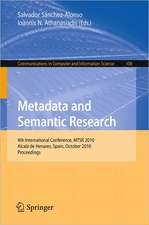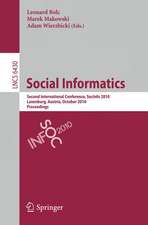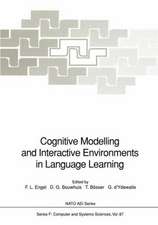Learning in Man-Computer Interaction: A Review of the Literature: Research Reports Esprit, cartea 1
Autor Tom Bösseren Limba Engleză Paperback – 30 oct 1987
Din seria Research Reports Esprit
- 20%
 Preț: 332.71 lei
Preț: 332.71 lei - 20%
 Preț: 644.81 lei
Preț: 644.81 lei - 20%
 Preț: 334.20 lei
Preț: 334.20 lei -
 Preț: 382.36 lei
Preț: 382.36 lei - 20%
 Preț: 478.74 lei
Preț: 478.74 lei - 20%
 Preț: 647.28 lei
Preț: 647.28 lei - 20%
 Preț: 640.69 lei
Preț: 640.69 lei - 20%
 Preț: 325.63 lei
Preț: 325.63 lei - 20%
 Preț: 324.64 lei
Preț: 324.64 lei - 20%
 Preț: 650.73 lei
Preț: 650.73 lei - 20%
 Preț: 339.80 lei
Preț: 339.80 lei - 20%
 Preț: 641.49 lei
Preț: 641.49 lei -
 Preț: 387.38 lei
Preț: 387.38 lei - 20%
 Preț: 337.52 lei
Preț: 337.52 lei - 20%
 Preț: 328.79 lei
Preț: 328.79 lei - 20%
 Preț: 325.30 lei
Preț: 325.30 lei - 20%
 Preț: 642.19 lei
Preț: 642.19 lei - 20%
 Preț: 640.19 lei
Preț: 640.19 lei - 20%
 Preț: 330.10 lei
Preț: 330.10 lei - 20%
 Preț: 639.52 lei
Preț: 639.52 lei - 20%
 Preț: 329.11 lei
Preț: 329.11 lei - 20%
 Preț: 327.29 lei
Preț: 327.29 lei - 20%
 Preț: 641.87 lei
Preț: 641.87 lei - 20%
 Preț: 335.18 lei
Preț: 335.18 lei - 20%
 Preț: 326.13 lei
Preț: 326.13 lei - 20%
 Preț: 323.34 lei
Preț: 323.34 lei - 20%
 Preț: 331.58 lei
Preț: 331.58 lei - 20%
 Preț: 639.85 lei
Preț: 639.85 lei - 20%
 Preț: 322.35 lei
Preț: 322.35 lei - 20%
 Preț: 645.31 lei
Preț: 645.31 lei - 15%
 Preț: 644.49 lei
Preț: 644.49 lei - 20%
 Preț: 327.44 lei
Preț: 327.44 lei - 20%
 Preț: 645.47 lei
Preț: 645.47 lei - 20%
 Preț: 640.19 lei
Preț: 640.19 lei - 20%
 Preț: 345.59 lei
Preț: 345.59 lei - 20%
 Preț: 331.58 lei
Preț: 331.58 lei - 20%
 Preț: 328.60 lei
Preț: 328.60 lei - 20%
 Preț: 334.38 lei
Preț: 334.38 lei - 20%
 Preț: 334.38 lei
Preț: 334.38 lei - 20%
 Preț: 650.27 lei
Preț: 650.27 lei - 15%
 Preț: 657.90 lei
Preț: 657.90 lei - 20%
 Preț: 326.78 lei
Preț: 326.78 lei - 20%
 Preț: 656.84 lei
Preț: 656.84 lei - 20%
 Preț: 647.79 lei
Preț: 647.79 lei - 20%
 Preț: 333.04 lei
Preț: 333.04 lei - 20%
 Preț: 335.18 lei
Preț: 335.18 lei - 20%
 Preț: 645.47 lei
Preț: 645.47 lei - 20%
 Preț: 325.48 lei
Preț: 325.48 lei - 20%
 Preț: 658.98 lei
Preț: 658.98 lei
Preț: 644.15 lei
Preț vechi: 805.19 lei
-20% Nou
Puncte Express: 966
Preț estimativ în valută:
123.27€ • 128.22$ • 101.77£
123.27€ • 128.22$ • 101.77£
Carte tipărită la comandă
Livrare economică 14-28 aprilie
Preluare comenzi: 021 569.72.76
Specificații
ISBN-13: 9783540183914
ISBN-10: 3540183914
Pagini: 232
Ilustrații: XI, 218 p. With 2 Falttafeln.
Dimensiuni: 170 x 244 x 12 mm
Greutate: 0.38 kg
Editura: Springer Berlin, Heidelberg
Colecția Springer
Seriile Research Reports Esprit, Project 385. HUFIT
Locul publicării:Berlin, Heidelberg, Germany
ISBN-10: 3540183914
Pagini: 232
Ilustrații: XI, 218 p. With 2 Falttafeln.
Dimensiuni: 170 x 244 x 12 mm
Greutate: 0.38 kg
Editura: Springer Berlin, Heidelberg
Colecția Springer
Seriile Research Reports Esprit, Project 385. HUFIT
Locul publicării:Berlin, Heidelberg, Germany
Public țintă
ResearchCuprins
1. Introduction.- 1.1. Objectives.- 1.2 Perspectives for application.- 2. The Problem.- 2.1 The concept of ‘User-Friendliness’ — What is the ideal information-processing system from the user’s point of view?.- 2.2 Does the ideal system require no learning?.- 2.3 Theoretical foundations.- 2.4 Representation of knowledge.- 2.5 Prior knowledge of the user.- 2.6 Design options: Requirements for learning-support systems.- 2.7 Three faces of the user-model.- 2.8 Cost and benefit of training and practice.- 2.9 Objectives for further research.- 3. Modelling the Human-Computer System.- 3.1 The components of man-computer systems: Task / Device / User.- 3.2 Are separate descriptions of Task / Device / User knowledge possible?.- 3.3 Human information processing and cognitive modelling.- 3.4 Learning processes and learning-theories.- 3.5 Definitions of knowledge, skill and learning.- 3.6 Motivation, needs and decision-making.- 3.7 Known user needs and motivation.- 3.8 Formal modelling of the user.- 4. Methodological Considerations.- 4.1 Empirical methods for the description and analysis of knowledge and learning of computer users.- 4.2 Describing learning processes by learning curves.- 4.3 Estimation of expenditure for learning.- 4.4 Benchmark-tests.- 4.5 Methods for data collection.- 5. Empirical Studies.- 5.1 System variables in empirical studies.- 5.2 Command language (input language).- 5.3. Input devices.- 5.4 Format of output to the user and system modes.- 5.5 User support functions.- 6. Users.- 6.1 User classification.- 6.2 Education and training for computer use.- 7. Areas of Application.- 7.1 Text-editing.- 7.2 Training for CAD.- 7.3 Learning to program.- 7.4 Other areas of applications.- 7.5 Resumee.- 8. Perspectives for Modelling.- 8.1 Basic assumptions anddefinitions.- 8.2 Formal structure of our model.- 8.3 Validation of cognitive models.- 8.4 Scenario for the use of a model based evaluation methodology.- 8.5 User models in MCI.- 8.6 Motivation in user-models.- References.- A Classification.- B Literature.















